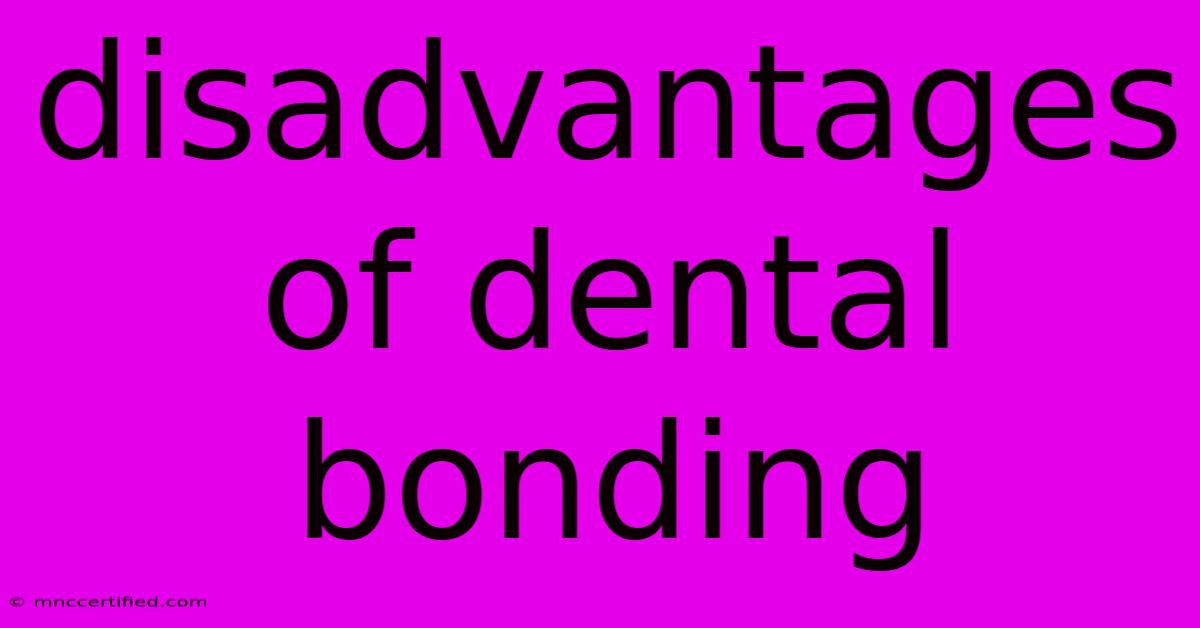Disadvantages Of Dental Bonding

Table of Contents
Disadvantages of Dental Bonding: What You Need to Know Before You Go
Dental bonding is a popular cosmetic dentistry procedure offering a quick and relatively inexpensive way to improve the appearance of your teeth. It involves applying a tooth-colored resin to the surface of your teeth to repair chips, cracks, discoloration, or gaps. However, like any dental procedure, bonding isn't without its drawbacks. Understanding the disadvantages of dental bonding is crucial before you decide if it's the right choice for you.
Potential Downsides of Dental Bonding
While dental bonding offers many benefits, several disadvantages should be considered:
1. Not as Durable as Other Procedures:
This is perhaps the biggest disadvantage. Dental bonding is not as strong or durable as other restorative procedures like porcelain veneers or crowns. It's more susceptible to chipping, cracking, and staining, especially with teeth subjected to significant biting forces or those used for chewing hard foods. The lifespan of a dental bonding procedure is significantly shorter, often requiring replacement or repair within 3-10 years, depending on the location and usage of the bonded tooth.
2. Staining and Discoloration:
Despite being tooth-colored, bonded resin can be prone to staining over time. This is particularly true if you consume heavily pigmented foods and beverages like coffee, tea, red wine, or berries. Unlike natural tooth enamel, bonded resin is more porous and readily absorbs these stains. While professional cleaning can help, it might not completely remove stubborn stains. Maintaining impeccable oral hygiene is crucial to minimize staining.
3. Sensitivity to Temperature Changes:
Some patients experience increased sensitivity to hot and cold temperatures after dental bonding. This is because the bonding process requires etching the tooth's enamel, potentially exposing microscopic tubules leading to the nerve. While this sensitivity often subsides within a few weeks, some patients experience ongoing discomfort.
4. Limited Repair Options:
Should the bonding chip or crack, repairing it can be challenging. The repair often doesn't blend seamlessly with the original bonding, leading to an uneven or noticeable appearance. Extensive damage might necessitate complete replacement of the bonding, adding to the overall cost and time commitment.
5. Not Suitable for All Cases:
Dental bonding is not a suitable solution for every dental issue. It's generally not recommended for extensive tooth damage, severe discoloration, or significant structural problems. In such cases, other restorative treatments like veneers or crowns are more appropriate. Your dentist will assess your specific needs and determine whether bonding is a viable option.
6. Requires Careful Aftercare:
To maximize the longevity of your dental bonding, meticulous aftercare is essential. This involves maintaining excellent oral hygiene, avoiding biting on hard objects, and potentially adjusting your diet to minimize staining. Neglecting aftercare can significantly reduce the lifespan of the bonding and increase the risk of damage.
Alternatives to Dental Bonding
If the disadvantages of dental bonding outweigh its benefits for you, consider these alternatives:
- Porcelain Veneers: More durable and resistant to staining than bonding, offering a longer-lasting solution.
- Dental Crowns: Ideal for severely damaged or decayed teeth, providing excellent protection and strength.
- Teeth Whitening: A less invasive option for addressing discoloration, offering a brighter smile without altering the tooth structure.
Conclusion
Dental bonding is a viable option for addressing minor cosmetic imperfections. However, it's crucial to weigh the advantages and disadvantages carefully before proceeding. Understanding the potential limitations regarding durability, staining, and sensitivity will help you make an informed decision and manage your expectations realistically. Always consult with your dentist to discuss your options and determine the best course of action for your individual needs and dental health. They can help you assess whether dental bonding is the right choice for you or if an alternative treatment would be more beneficial in the long run.

Thank you for visiting our website wich cover about Disadvantages Of Dental Bonding. We hope the information provided has been useful to you. Feel free to contact us if you have any questions or need further assistance. See you next time and dont miss to bookmark.
Featured Posts
-
Warrior Trading Plain Truth Book
Nov 22, 2024
-
Princeton Swimming And Diving Vs Penn Cornell
Nov 22, 2024
-
Human Animal Bond Certification
Nov 22, 2024
-
Bail Bond Agent Job Description
Nov 22, 2024
-
Arsenal 1 0 Juventus Live Womens Champions League
Nov 22, 2024